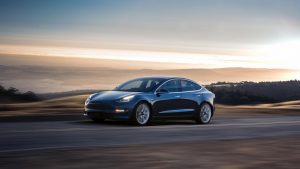By Collin Bonnell

This past June, Tesla made a stunning announcement when it declared that it was in exploratory talks with the Shanghai Municipal Government to build a large car factory in China. While this would be routine procedure for most automobile titans, it was a strange turn for Tesla, a company that is widely seen as a potential powerhouse of the American green economy.
Tesla’s motivations, however, are quite clear. In an age of expanding domestic markets, China has implemented a protectionist trade policy, with an astounding 25 percent automobile tariff, according to an article from Reuters.
China’s rules also require foreign companies to select a local manufacturing partner and give them at least a 50 percent stake in all factories to avoid steep tariffs. Despite these strict trade rules, Tesla sees a huge room for growth, and its stock jumped 1.7 percent in the hours after its June 22nd announcement.
According to The New York Times, Tesla needs to compete in rapidly expanding Asian markets in order to stay afloat, many of which have complicated trade policies designed to make foreign companies uncompetitive. Despite this, Tesla sees an opportunity for circumventing these laws by building its new Model S and planned Model Y cars overseas. Due to strict trade laws, a Model S sells in China for between $104,000 and $203,000 compared to between $70,000 and $140,000 in America. The higher prices for the car in China make Tesla uncompetitive in a country that is becoming increasingly central to its business strategy. Yet, while the move does make sense, we should stop to consider the downsides of an up-and-coming American manufacturing giant moving some of its operations overseas. American automobile companies have been outsourcing jobs overseas for decades at a high cost for the American worker.
While it can be argued that members of the green economy, like Tesla, can justify outsourcing jobs as a way to make the largest environmental impact in the quickest amount of time, the economic trauma which the practice has caused to the American economy in the past shows that outsourcing is an economic evil which must be avoided. This is something that Trump, for all of his flaws, expressed on the campaign trail. On the campaign trail, Trump made a variety of outrageous and invalid arguments; however, I did agree with one point he made. American free trade practices and crony capitalism have rigged our economy and drained our middle class.
When the effects of foreign competition were first felt in the 1970s, we made a variety of mistakes to regain our economic position. To combat the rise of the foreign automotive industry and the decline of American manufacturing, our government declared war on labor protections and gave into pressures from corporate interests to do away with regulations. In the decades since, American giants like Ford, GM and Apple have moved their manufacturing centers overseas to save money and those that have stayed have been increasingly abusive towards their workers.
This has been a blessing for wealthy Americans, who have seen their incomes continually skyrocket and their political dominance increase. Yet these policies have spelt disaster for the old industrial middle class. The decline of labor protections meant that these workers were laid off whenever their employers saw fit and many witnessed their wages shrink. However, politicians seemed to largely ignore this until the 2016 election. Trump’s campaign rode the alienation of these neglected working class voters all the way to the White House and they continue to be his main base of support. His presidency thus far has been rocked by one major self-induced scandal after another, yet these voters remain loyal. His only path towards political survival may be to fulfill his campaign promises and block Tesla’s plans to set up shop in China.
The green economy is one of the few hopes left for the American worker. Tesla has itself announced a plan to build a $5 billion “Gigafactory” in Nevada. Elon Musk, CEO of Tesla, has also talked of revolutionizing American infrastructure and was a brief source of hope when he was announced as one of Trump’s economic advisors, until he resigned over one of Trump’s scandals. Today, Musk seems to be the only American businessman interested in the social and economic well-being of his neighbors. Musk has a moral obligation to keep his manufacturing centers in the United States, and if he does not, Trump should follow through on his campaign promises and levy large taxes against his companies.
If American companies continue to flee our markets, our only hope may be to abandon free trade altogether and implement protectionist trade policies to protect our middle and working class. The American worker deserves better than their current situation and our government should protect their well-being by all means necessary.
Collin Bonnell, FCRH ’21 is a history and political science major from Hingham, Massachusetts.




































































































































































































